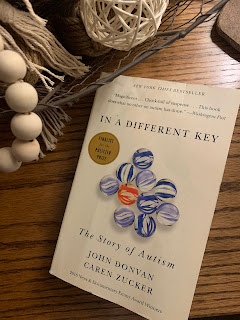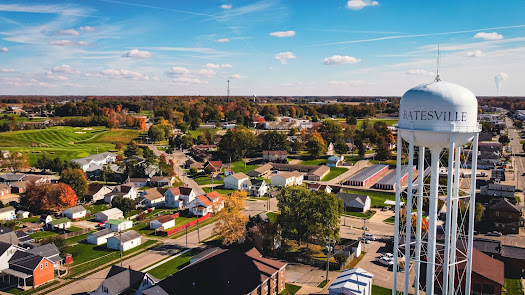Strong Advocates and Small Communities
I recently watched an incredible PBS documentary about autism. (Watch it here.)
I then decided to buy the book to get the full story. Here my book review, five days shy of the 25th anniversary of my brother John’s diagnosis with autism.
Case 1 (which very much was not Case 1) of autism is still alive today. His name is Donald Triplett.
When we think of illnesses or diseases or medical discoveries, we may think of the first cases being reported in Medieval Times or even depicted on cave walls. But for me, much goes back to maybe around 1800/1820 - when records really started being recorded and shared... when data started to become more important. Either way, I think of all illness that relate to me or my family to have been studied or known about for 100+ years - easily.
But not autism.
Case 1 started less than century years ago in a little town in Mississippi.
Donald Triplett was born in 1933. And he reminds me much of my brother.
Deeply rooted in routines, they both could be found as children picking up a toy and dropping it and picking it up again and dropping it. For hours. Upon hours. With little emotion or words.
Both Donald and my brother can study your features intensely and look right through you in the same glance.
When Donald grew up out of the toddler stage and into the school age, his parents were concerned. How were they going to send this little boy to school? A little boy who wasn't sickly, but wasn't "with it?" A little boy who knew so much, but so little at the same time...
From one doctor to another they went, in the state of Mississippi. Until they finally got in with the State Hospital. There doctors advised Donald's parents to send him to an institution.
They made it all seem very okay.
This is what we do with kids like this.
So Donald and his mom and his dad packed up in the car and headed for the institution.
They met with the doctors there, had their meeting, and then - rather cooly and kindly - were asked to leave.
And though the book is more lengthy (and heartbreaking) in its description, a strong but gentle young mother and an educated, but empathetic father dropped their young son at a facility and were strongly encouraged by doctors to try their best to "forget about him."
Mr. and Mrs. Triplett got back in their car - without Donald - but with the instruction to "do your best to forget about your son."
I cannot imagine the ride home.
Knowing that he does know you are his mama.
Knowing that he is aware he has a bedroom and toys.
Knowing that he had to have brought a smile to their face and they to his as well.
I wonder if they cried.
If they laid in bed that night trying to talk themselves into this being right while their heart said this is wrong.
I wonder how many mamas before Mrs. Triplett felt the EXACT same way, but didn't know how to speak up.

But all this was industry standard in 1940 and prior… and would remain fairly acceptable into the early 1980s.
It was industry standard long before the '40s. Records of what the book refers to as “madmen” were once considered closer to the divine or more in tune with another world. But as the world evolved (if you dare call it that) these people were often abused, killed, left for dead, locked away, or used essentially as lab rats to do wild and crazy testing of products on.
But even if we ignore all the really bad history, we still have an ugly recent history.
I think a lot about if John was born a decade earlier. What would protocol been? What would they had told my mom?
John was born in 1992. On my 7th birthday (1-11-98) , John was officially diagnosed with autism. In the days and weeks after John's diagnosis I remember my mom (mostly) being a little stressed. But nothing too crazy.
Now that I'm a mom, she has opened up a little more about her experience.
Shortly after John's diagnosis, mom was taken to a place - sort of like a huge conference room. Tables spread out and pieces and parts and small hand powered machines were on them. And people with obvious mental and physical disabilities were working at the tables. Some independently and others with assistance from staff this facility.
The woman giving the tour told mom that John's working life - the bulk of his life - would "be this - best case scenario."
She went home and cried.
That's all you can or should expect rolling in her brain all night and still there loud as ever the next day.
Long story, short... That is NOT what we need to tell mamas.
And my heart breaks when I think too long about what my mom was told... what Mrs. Triplett was told.. what so many mams who have long left this earth were told...
We have a lot of learning yet to do in the world of autism. We're going to need a more patient world, a little more empathic world (don't confuse that with sympathetic), and little more loving world if we want to see people with autism and all kinds of special needs thrive.
My biggest take-aways from the documentary - and one I totally agree with as a sister of someone with autism - is this:
You cannot cure autism, but it can thrive if the following two factors are present:
1.) The person with autism has a consistent advocate (a powerhouse parent typically)
and
2.) Live in a small community/home-town where "every knows your name" feels exist.
I think my baby brother has been blessed with both. And for that, I am forever grateful.
I strongly encourage you to read the book and better understand
- how the evolution of terms (derogatory, medical, and everything in between) came about
- the story of Dr. Kanner (pronounced Conner) who termed autism
- the sweet story of Donald and how he is doing today as an elderly man, still in his hometown of Mississippi
- how our communities and country have adapted and changed to help people with autism
- how we still have more work to do in terms of understanding autism and how it affects people and families and communities
Much love always,
Samantha













Comments
Post a Comment